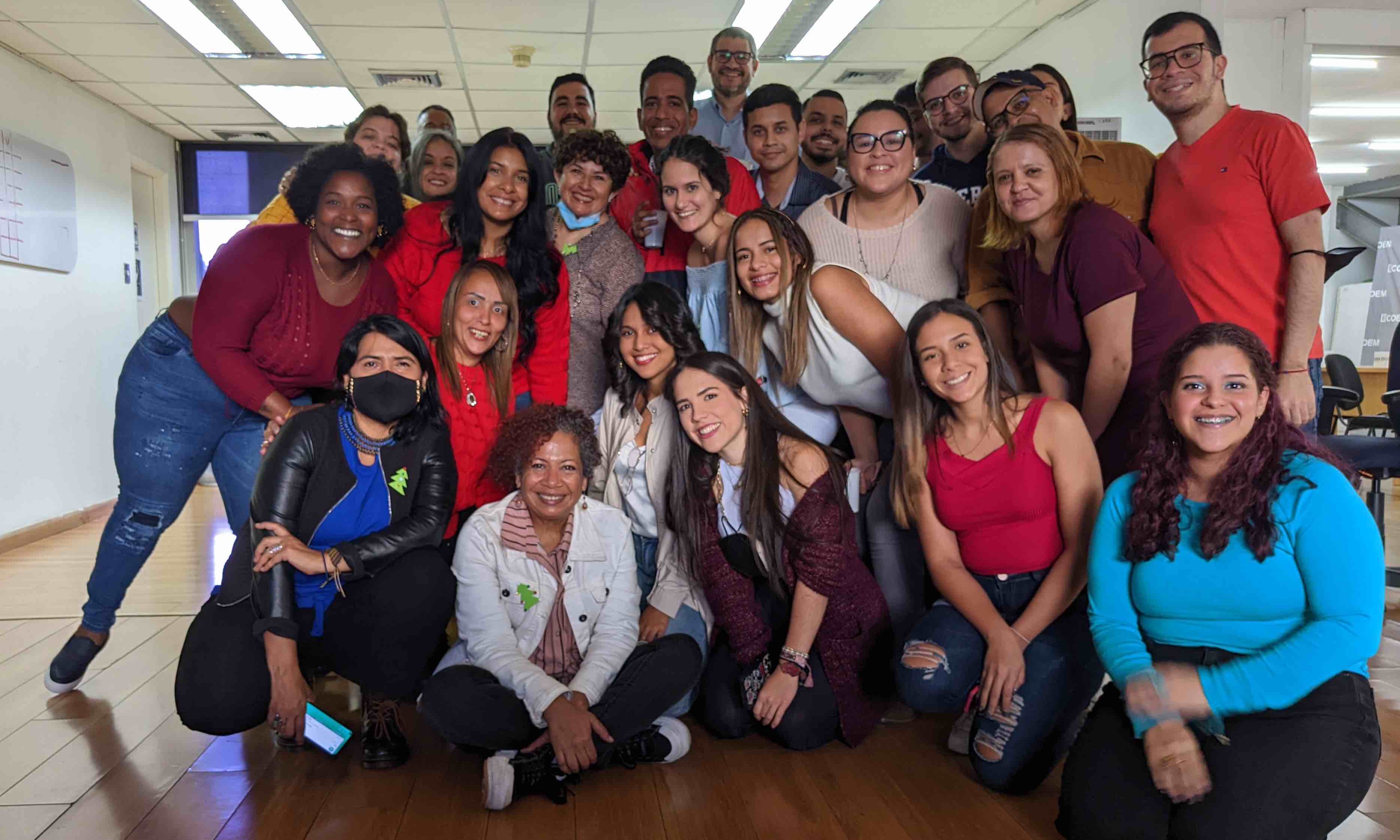Forced out from print and airwaves, news media in Venezuela shift to digital to survive

The members of Efecto Cocuyo's team. | Credit: Efecto Cocuyo
In the last two decades, dozens of news outlets have disappeared in Venezuela. Between 2013 and 2022, more than 60 Venezuelan newspapers went out of circulation indefinitely due to lack of funds, control by the government or inability to buy enough paper to print their editions. Television broadcasters have either been forced to self-censor or have disappeared. Ten foreign broadcasters have also been forced out.
Perhaps the outlets most vulnerable to government shutdowns have been radio stations. Between 2003 and 2022, at least 285 radio broadcasters have shut down. This figure reflects 71% of the total number of media outlets closed during that period, according to the Venezuelan NGO Espacio Público. In 2022 alone, the Venezuelan government ordered the closure of at least 95 radio broadcasters.
These closures were carried out by the National Telecommunications Commission, CONATEL by its acronym in Spanish. In many cases, the Commission alleged that the radio stations were operating clandestinely, without a licence. However, the government has revoked broadcasting licences of critical media outlets before.
In addition to censorship, the government has also used legal action to suppress free speech. Authorities have charged journalists and media workers with crimes such as defamation, slander, and terrorism, which provide an impediment for outlets and journalists to continue reporting. Others have had their assets confiscated and their offices seized by government officials. In other cases, independent outlets have not been shut down, but bought off to influence their coverage of government policies.
With traditional media outlets at peril in the country, are journalists embracing digital as a way to keep holding power to account? How are these digital-born news organisations managing to operate in this challenging environment? Which obstacles are they facing? These are the questions at the heart of this piece, which includes the views of academics, high-profile editors and investigative journalists who know the country and its shrinking media ecosystem.
An unstable media landscape
Journalism in Venezuela did not always look this dire. However, with the election of left-wing leader Hugo Chávez in 1998, the government implemented media policies aimed at controlling the flow of information to the public. The government passed laws that limited freedom of expression, punished dissenting voices, and targeted independent media outlets.
After Chávez’s death in 2013, Nicolás Maduro became President and his government continued to implement policies aimed at limiting pluralism in the news media. For Carlos Arcila Calderón, associate professor at the University of Salamanca, this transformation has led to two distinct media sectors emerging: independent news outlets and outlets subsidised by the state.
“It is still a very unstable [media] landscape,” says Arcila Calderón. “The only ones that have stability are either government outlets, because they always have money from the government, or private ones that have negotiated with the government.”
Andrés Cañizález is the editor of fact-checking site Cotejo and the director of Mediánalisis, a non-profit organisation dedicated to promoting journalism and independent information in Venezuela. He’s been a journalist in Venezuela for over three decades and has seen first hand the gradual decline of independent journalism in the country. “The space for independent work has been shrinking,” he says.“Independent journalism is always under threat. It is always questioned by those in power, but that space is maintained.”
Journalism survives online
At the dawn of the 2010s, there was an explosion of independent digital media outlets in Venezuela. News sites like El Pitazo, Efecto Cocuyo, Armando.info and Runrun were founded by veteran Venezuelan journalists as an alternative to print journalism in a declining media space. A number of traditional media outlets, including newspapers that could not maintain their printed editions like El Nacional or Tal Cual, also transformed to digital-only offerings.
"The hope is in digital," Arcila Calderón says. "People who want to look for reliable information [in Venezuela] have taken to the internet."
Cañizález describes a metamorphosis in the country’s media environment after the massive closure of newspapers and radio stations in the country. While traditional independent media has struggled to survive, there has been a “spring in independent journalism” in the digital space. “Here we have a group of older and younger journalists who have managed to get together to inform [the public],” he says.
One of those outlets is Armando.info, an investigative outfit founded by veteran journalists in 2014, when the Venezuelan government was buying out legacy news organisations. The 20-person newsroom subsists through contributions from a number of international organisations. “Digital media emerged not so much because we wanted to be in the digital modernity, but because we need to continue doing journalism,” says Patricia Marcano, editorial coordinator at Armando.info.
For Luz Mely Reyes, co-founder of Efecto Cocuyo, the transition to digital media in the country was also a “forced migration” to the digital space.
Efecto Cocuyo, an independent Venezuelan digital news site launched in 2015, covers a range of topics from political movements to migration and climate change. The newsroom employs approximately 30 people and its funding comes from a variety of different sources ranging from well-recognised international organisations, donations and advertisement.
“The digital space is a raft we climbed on so that we would not be dragged down by the authoritarian current and the dismantling of the news industry,” Reyes says.
Internet blockages and new legislation
Not everything is smooth sailing for digital outlets. Despite the promise the internet brings as a tool of news delivery, the Venezuelan government continues to find ways to block access to independent news sites.
Internet blockages are frequent in the country with CANTV, the state-run internet service provider (ISP), leading the list of operators that most frequently blocks websites. Privately-owned ISPs participating in the blockades include Spanish-owned Movistar and local enterprises such as Digitel, Inter, Netuno, and Supercable. A recent report from VE Sin Filtro, a Venezuelan watchdog that monitors internet censorship, outlined at least 59 websites which were blocked by these providers, with at least 35 of them being independent news sites.
For Cañizález, independent digital media outlets have to fight an uphill battle to reach their audiences. “These outlets are disseminating information in a country where many people do not have continuous internet or quality internet and then they suffer these blockades,” he says. “So they have to give indications to users on how to use VPNs.”
Armando.Info is one of the news sites that has experienced blockades. Marcano says they have developed strategies to get information to their audience despite these censorship tactics. “Digital outlets exist, but the truth is that it is hard for people to read us,” she says. “We have to develop a whole educational strategy so that people learn what a VPN is and how to activate it on their cell phone or on their computer. At the same time, we have had to develop these mirror sites to distribute our links in social networks.”
Mirror sites are replicas of a website’s original domains which in this case allows Venezuelan news organisations to distribute their articles and links on social media when the government blocks their original domains.
Shrinking revenue streams
Securing funding has also become increasingly difficult for independent media outlets. Many rely on donations from international NGOs, funds from foreign governments, and even crowdfunding campaigns.
Reyes from Efecto Cocuyo says she has seen philanthropy and international funding dwindle in the last few years, which has made the profession more vulnerable in the country. “How can we make ourselves sustainable? How can we look for funds that allow journalists to keep reporting in the current context?” she asks.
Earlier this year, the Venezuelan government introduced a bill that would allow the government to oversee the performance and finances of NGOs. The bill has been criticised by the UN and a number of international nonprofits as a threat to civic society in the country. There are also implications for independent media outlets registered as nonprofits.
“What could happen is that some digital media outlets could come down in this attempt to close and restrict the work of NGOs,” says Marcano from Armando.info. She also describes an environment where digital-born news outlets are facing the same challenges legacy news organisations faced before.
Access to information is difficult as data is obfuscated by the government; government authorities refuse or ignore interview requests; and journalists are being physically limited by the authorities from covering protests or sites of natural disasters. Moreover, journalists suffer job precariousness due to the economic landscape in the country, forcing many to take additional jobs to survive.
“I believe the future is digital for Venezuelan journalism because we still have room to manoeuvre and we can continue to be independent,” says Marcano, “but I also don’t want to be so idealistic. What happened to our colleagues in Nicaragua, Cuba or Russia can happen to us too at any moment and then we won’t be able to operate from the country.”
Meanwhile, pro-government media, both owned by the government and privately, tend to have more resources as a benefit of parroting the government’s vision. “They give pro-government information with a minimum level of criticism,” says Arcila Calderón. “As the country is polarised, depending on your political leanings you trust the media on one side or the other.”
Looking ahead
A number of Venezuelan journalists are already working from exile, with members of the newsrooms of both Armando.info and Efecto Cocuyo living abroad. “Just as seven million people in Venezuela have emigrated, journalists have also had to emigrate for different reasons, some for persecution and others to seek better living conditions,” says Reyes.
However, despite this brain drain, many Venezuelan journalists are reporting tirelessly in exile – and many young journalists who perhaps would have left the country five years ago are now deciding to stay.
Professor Arcila Calderón says that most of the journalism students he had in Venezuela ended up leaving the country. “The new generations, those of the last two or three years, are a little more hopeful and fighting for the country and for the ideals of democracy,” he says.
It seems unlikely that political change will come anytime soon, according to Reyes. However, she believes that the future of journalism in the country lies in creating alliances between journalists and independent media.
Along with other journalists, she’s just launched the Alianza ProPeriodismo, whose goal is to foster connections to promote the defence of independent journalism in the country. “There will be a space for independent media that are not aligned with the traditional power structures in our society," Reyes says. “That is why I do all the work I do and I know that we need to keep doing it.”
For Reyes, the Alianza exists to move towards a cooperative framework among journalists and outlets to preserve what is left of the independent media landscape in the country and keep the public informed. “The main interest in an authoritarian context is not the survival of a media outlet," she says, "but the survival of the media ecosystem that allows independent journalism.”
In every email we send you'll find original reporting, evidence-based insights, online seminars and readings curated from 100s of sources - all in 5 minutes.
- Twice a week
- More than 20,000 people receive it
- Unsubscribe any time
signup block
In every email we send you'll find original reporting, evidence-based insights, online seminars and readings curated from 100s of sources - all in 5 minutes.
- Twice a week
- More than 20,000 people receive it
- Unsubscribe any time







